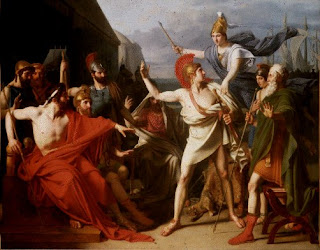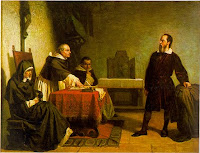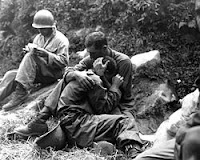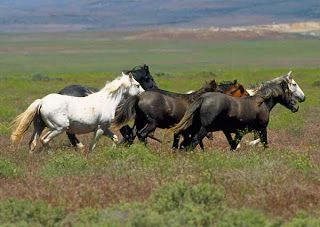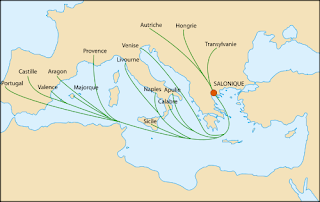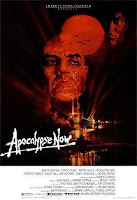WTF DNA Pt II: Good Breeding
According to Wikipedia: "Inbreeding is the reproduction from the mating of two genetically related parents, which can increase the chances of offspring being affected by recessive or deleterious traits. This generally leads to a decreased fitness of a population, which is called inbreeding depression." Ouch.
Good breeding has its benefits. Because nobles traditionally married their cousins, kinsmen were eventually placed on all of Europe's thrones. High intelligence, artistry, physical virtuosity, and other expressions of excellence were heightened. Yes, musical virtuosity runs in families.
But then again, the Royals also spawned the likes of Mad King George. "Insanity" was rather common among the aristocracy. Hence, the lovely expression, "black sheep."
[LEFT: "Mad" King George III of England: Wikicommons]
The gentry (families who owned sufficient land to generate income) generally aped the aristocracy, and married (locally) among their "Own Kind." Because of the limited gene pool, gentle folk also experienced "genetic irregularities."
Nuts
Some mentally challenged offspring were said to be "imbeciles," or possessed by "demons," but most were merely rebels or geniuses (for good or bad). What's the difference between a lunatic, a fool, a heretic, a visionary, a traitor, a champion, and/or a saint? PUNCHLINE: The audience or community of said individual.
[RIGHT: Galileo facing the Roman Inquisition, painting by Cristiano Banti: Wikicommons]
Galileo, for example, was both a genius (to scientists, philosophers--the rationalist/enlightened vanguard) as well as a heretic (Roman Catholic Church & their adherents). Galileo was also a fool to many because he naively believed he could Tell the Truth, given his dark time and place. But such recklessness also made him a Champion. Eventually, even the Roman church, which is never, officially, wrong, acknowledged Galileo was right. And it only took the papacy 500 or so years to come clean.
Good breeding has its benefits. Because nobles traditionally married their cousins, kinsmen were eventually placed on all of Europe's thrones. High intelligence, artistry, physical virtuosity, and other expressions of excellence were heightened. Yes, musical virtuosity runs in families.
But then again, the Royals also spawned the likes of Mad King George. "Insanity" was rather common among the aristocracy. Hence, the lovely expression, "black sheep."
[LEFT: "Mad" King George III of England: Wikicommons]
The gentry (families who owned sufficient land to generate income) generally aped the aristocracy, and married (locally) among their "Own Kind." Because of the limited gene pool, gentle folk also experienced "genetic irregularities."
Nuts
Some mentally challenged offspring were said to be "imbeciles," or possessed by "demons," but most were merely rebels or geniuses (for good or bad). What's the difference between a lunatic, a fool, a heretic, a visionary, a traitor, a champion, and/or a saint? PUNCHLINE: The audience or community of said individual.
[RIGHT: Galileo facing the Roman Inquisition, painting by Cristiano Banti: Wikicommons]
Galileo, for example, was both a genius (to scientists, philosophers--the rationalist/enlightened vanguard) as well as a heretic (Roman Catholic Church & their adherents). Galileo was also a fool to many because he naively believed he could Tell the Truth, given his dark time and place. But such recklessness also made him a Champion. Eventually, even the Roman church, which is never, officially, wrong, acknowledged Galileo was right. And it only took the papacy 500 or so years to come clean.
Sympathy vs. Empathy, Pt I, Grief
Empathy and sympathy are distinct. Empathy is more sophisticated and, therefore, highly rare. Sympathy is your ability to appreciate how someone might be feeling by remembering how you once felt in a similar situation. For example: You see someone crying over the loss of a good friend and you remember a similar loss and the grief you experience(d). Some adults are sympathetic to the pleas of children because those adults remember what it was like to feel like a child. Nonetheless, while many adults may experience the same emotions of powerlessness, dependency, and related anger/sadness as they did when they were thwarted children, said adults don't see or understand the connection between their "justifiable" pain and the pain of "unreasonable" small children.
BTW, historically the "age of reason" begins when a child is seven. Before then, rationalizing with a child is, in my humble opinion, futile, and often stupid, given the obviously poor results.
One of the many, many problems with sympathy is that not everyone feels the same in similar situations. Sympathy may be disastrous in multicultural situations, and even within a family. Mistaken feelings are the stuff of diplomatic crisis (see: Middle East).
Take death and grieving. Each subculture mourns differently. Mourning varies also by socio-economic class. This may be obvious to you (but, alas, not even apparent to many), but...THE FOLLOWING CULTURES DO NOT EXIST: "Latino, Asian, European," "Black or White," and/or "American." There is not even a single "African-American" or, say, "Brazilian" culture; there is, perhaps, a Miami-Cuban subculture; a second-generation Jamaican-American subculture (distinct from subcultures found in Jamaica); a rural Michoacan Mexican subculture, which is centuries apart from, say, Urban-Jewish-South-American subculture(s), which share many features with, for example, Upper West Side/Riverdale subculture.
Getting back to grief: as with other volatile, primal, emotional states, results may vary. Some traditions/subcultures expect public grieving at funerals; a family might even pay a professional mourner.
In the Near East, as recorded in pre-historical biblical books, e.g., Genesis, and in Ancient Greece, as recorded in pre-classical writings, grief was ritualized. Sometimes public "grief," goes to extremes that violate the spirit of the custom. In many Latin traditions, for example, if you don't cry (women) or look broken up (men) at a relative's funeral, you "reveal" that you didn't "truly" love the deceased. My mother, btw, expresses this belief, but more on that some other time.
Now, let's examine some stereotypical grieving behavior, and start with funerals in the White Anglo Saxon Protestant tradition. If a woman were to break down & drape her crying body on the casket, many guests might react with horror. What might "horror" look like to an (this) outsider: eyes pop to their full circumference; eyebrows arch; backs stiffen; lips clench tight --sometimes disappearing into a fine line; face changes color (either becoming pallid or reddening), etc. A guest might be thinking: "For God's sake, woman! Keep it together. You're causing a scene! This, simply, will not do." As the British military motto goes: KEEP CALM, CARRY ON.
Irish wakes, on the other hand, are "notorious" laugh-fests where the music plays and booze flows freely. However, such licence for frivolity DOESN'T apply to the funeral home viewing or the funeral. And sometimes, such frivolity doesn't apply to the wake either. "Traditional" behavior varies by family, as in, "traditionally, in our family, we don't serve alcohol at wakes." This statement might be said through pursed lips, accompany a suppressed sniffle, and precede a phase such as "Excuse me, I have to attend to the...."
And, as you may have noticed, there are also different/double grief standards for women vs. men.
Sympathy doesn't integrate the above variations into a coherent emotional response. Sympathy refers only to how I felt in a similar, or the same situation...
Want more?? Check in this week for Part II, or better yet, become a blog "follower" & get notified of updates.
BTW, historically the "age of reason" begins when a child is seven. Before then, rationalizing with a child is, in my humble opinion, futile, and often stupid, given the obviously poor results.
One of the many, many problems with sympathy is that not everyone feels the same in similar situations. Sympathy may be disastrous in multicultural situations, and even within a family. Mistaken feelings are the stuff of diplomatic crisis (see: Middle East).
Take death and grieving. Each subculture mourns differently. Mourning varies also by socio-economic class. This may be obvious to you (but, alas, not even apparent to many), but...THE FOLLOWING CULTURES DO NOT EXIST: "Latino, Asian, European," "Black or White," and/or "American." There is not even a single "African-American" or, say, "Brazilian" culture; there is, perhaps, a Miami-Cuban subculture; a second-generation Jamaican-American subculture (distinct from subcultures found in Jamaica); a rural Michoacan Mexican subculture, which is centuries apart from, say, Urban-Jewish-South-American subculture(s), which share many features with, for example, Upper West Side/Riverdale subculture.
Getting back to grief: as with other volatile, primal, emotional states, results may vary. Some traditions/subcultures expect public grieving at funerals; a family might even pay a professional mourner.
In the Near East, as recorded in pre-historical biblical books, e.g., Genesis, and in Ancient Greece, as recorded in pre-classical writings, grief was ritualized. Sometimes public "grief," goes to extremes that violate the spirit of the custom. In many Latin traditions, for example, if you don't cry (women) or look broken up (men) at a relative's funeral, you "reveal" that you didn't "truly" love the deceased. My mother, btw, expresses this belief, but more on that some other time.
Now, let's examine some stereotypical grieving behavior, and start with funerals in the White Anglo Saxon Protestant tradition. If a woman were to break down & drape her crying body on the casket, many guests might react with horror. What might "horror" look like to an (this) outsider: eyes pop to their full circumference; eyebrows arch; backs stiffen; lips clench tight --sometimes disappearing into a fine line; face changes color (either becoming pallid or reddening), etc. A guest might be thinking: "For God's sake, woman! Keep it together. You're causing a scene! This, simply, will not do." As the British military motto goes: KEEP CALM, CARRY ON.
Irish wakes, on the other hand, are "notorious" laugh-fests where the music plays and booze flows freely. However, such licence for frivolity DOESN'T apply to the funeral home viewing or the funeral. And sometimes, such frivolity doesn't apply to the wake either. "Traditional" behavior varies by family, as in, "traditionally, in our family, we don't serve alcohol at wakes." This statement might be said through pursed lips, accompany a suppressed sniffle, and precede a phase such as "Excuse me, I have to attend to the...."
And, as you may have noticed, there are also different/double grief standards for women vs. men.
Sympathy doesn't integrate the above variations into a coherent emotional response. Sympathy refers only to how I felt in a similar, or the same situation...
Want more?? Check in this week for Part II, or better yet, become a blog "follower" & get notified of updates.
Art Collecting (Updated)
I've always wanted to collect art, but my budget was limited (which is to say non-existent). BUT, now I have a Higher Purpose (read: rationalization) & can justify art purchases as investments. The theory is that I can always sell some & make enough money to finance a few pieces for myself.
"Investment" is the password that unlocks my SuperEgo Cash Register & "Bargain Whoring" is what misdirects/corrupts the Virtuous Cashier. Generally, I'm neurotic re: living w/in my means.** But after quitting paid work to pursue motherhood, art, & community service, and enduring upteen years of grad-school poverty, well... The ID is in ascendance, and the EGO staged a coup, in the interest of peace & functional sanity. In other words, it's finally my turn to get some.***
My focus: Art by Jewish Artists, Religious artifacts, and/or Judaica/Catholicaica.
What I have: limited edition prints (lithographs & seriographs); original watercolors; ceremonial objects/clothes; art by local/self-taught/traditional artisans.
As for High Art: When I first discovered that my grandfather was Sephardic, I bought a Chagall print--something I've long wanted. It was a giclee of floating lovers w/ Eiffel Tower in background. (Future: Print-Collecting 101/Terminology Post).
Then, @ auction, I bought limited edition Chagall lithographs (thumbnails).
Plus, mixed media watercolor original by Israeli, Patricia Govezensky. And Steynovitz's Sukkot ii serigraph. And "Symbols of Jerusalem" watercolor by Baghdad artist, Sami Zilkha.
Next up: Artisanal objects: Catholic & Sephardic/Jewish ceremonial
**Near the top of my List of GAME-CHANGING books: Your Money or Your Life, which explains the principle of Voluntary Simplicity & gives practical steps to achieve life-long financial balance, and consequently, life balance & vitality.
***Yes. I have a thing for Jungian Psychology. But you'll have to wait to learn more re: how Freud was wrong about almost everything, and Jung was more or less right.
"Investment" is the password that unlocks my SuperEgo Cash Register & "Bargain Whoring" is what misdirects/corrupts the Virtuous Cashier. Generally, I'm neurotic re: living w/in my means.** But after quitting paid work to pursue motherhood, art, & community service, and enduring upteen years of grad-school poverty, well... The ID is in ascendance, and the EGO staged a coup, in the interest of peace & functional sanity. In other words, it's finally my turn to get some.***
My focus: Art by Jewish Artists, Religious artifacts, and/or Judaica/Catholicaica.
What I have: limited edition prints (lithographs & seriographs); original watercolors; ceremonial objects/clothes; art by local/self-taught/traditional artisans.
As for High Art: When I first discovered that my grandfather was Sephardic, I bought a Chagall print--something I've long wanted. It was a giclee of floating lovers w/ Eiffel Tower in background. (Future: Print-Collecting 101/Terminology Post).
Then, @ auction, I bought limited edition Chagall lithographs (thumbnails).
Plus, mixed media watercolor original by Israeli, Patricia Govezensky. And Steynovitz's Sukkot ii serigraph. And "Symbols of Jerusalem" watercolor by Baghdad artist, Sami Zilkha.
Next up: Artisanal objects: Catholic & Sephardic/Jewish ceremonial
**Near the top of my List of GAME-CHANGING books: Your Money or Your Life, which explains the principle of Voluntary Simplicity & gives practical steps to achieve life-long financial balance, and consequently, life balance & vitality.
***Yes. I have a thing for Jungian Psychology. But you'll have to wait to learn more re: how Freud was wrong about almost everything, and Jung was more or less right.
Jew or NOT a Jew? Says WHO?
Let's play a version of Adam Sandler's: Jew or Not a Jew?
From NY Times:
PARIS — Centuries after the Spanish Inquisition led to the forced conversion of Jews to Catholicism, an ultra-orthodox rabbinical court in Israel has issued a religious ruling that recognizes descendants from the insular island of Majorca as Jews....
“The decision is a headline ruling,” said Rabbi Israel Wiesel, a judge from Israel who explored the community in Palma, roaming the street where, for generations, many chueta families have operated jewelry stores. “Unlike other Marranos in Spain and Portugal, who lost their line of history,” he said, “this particular community is unique and kept the pure line of history for the last 700 years, which means they are Jewish.”
Read more re: Majorcan Jews
MY (albeit hyper-biased) TAKE:
Marranos, which means swine, is a term of disrespect/contempt. Interesting: both ultra-orthodox Jews & hard-core Christians share the same terminology & similar beliefs. Apparently, they both think "conversos" can go to Hell.
Majorcans: A-OK Jews, but "other" Sephards: NOT "our" kind.
I'm guessing A-OKs could document "proper" descent via maternal line. Lately, I've heard a lot re: Jewish birthrights. To be precise, when I mention that I recently discovered my paternal grandfather was Sephardic or Jewish, the next line of dialogue goes something like: But you're not Jewish unless your mother is Jewish.
Odd. Women don't count (literally) in Torah; genealogy recorded via males, who beget & beget..., ad nauseum. My name-sake Dinah, daughter of Jacob, i.e., Father Israel, doesn't merit a tribe; she doesn't even get to speak--her two brothers decide they'll do ALL the talking, decisioning, & killing for the family. SEE: The Red Tent
But now, apparently, mother ancestors are valid, but fathers are not. Nonetheless, women still sit in back of synagogue. I get it. When it's my turn at the table, women don't count, but when women do count, it's still not my turn @ the table.
OY, first the Catholic Church rejects me, now this! When will my wandering cease?
BUT HA, ultra-orthodox Jew-keepers! I got Chosen blood from women in my family too! Yes, Girl Power! All my maternal names (and paternal grandmother's name) are recognized Sephardic or Converso names: Carvalho, Pinto, Obispo, Sousa (Abravanel).
Coming up this month: Why Sephardim have Garden-of-Eden-esque names...
[Caption] The Portuguese Carvalho original coat of arms, as used by the Marquis of Pombal.
Decoding (my) Sephardic Heritage: Name Game, Exhibit A
I recently discovered that I'm likely of Jewish blood. Which is to say, my ancestors may have originated in Israel. Long Story. [Seriously long: I might even jump back to King David.]
Today, I begin my treatise on Sephardic Portuguese family names.
My father's family are likely relatively recent converts to Catholicism. The name Vazao is one of a kind. Translation: safety valve in a water system (read: sewer) created to prevent rupture. Used idiomatically -- dar vazao a-- to vent (potentially explosive) volatile thoughts. With a name like that, who would not muck-rake?
I traced Vazao @ NY Public Library Jewish genealogy room to Varzao, and then Varsano. The Italian s sounds the same as the Portuguese z. The name is registered @ Synagogue in Pulia, on the heal of Italy, along the Adriatic, and may trace back to Salonika (Thessalonia) in Macedonia/Greece, a major Jewish hot spot, aka, the Jerusalem of the Balkans.
Future Posts Watch:
"The Italian Connection," which includes comment re: Fellini film, Amarcord, one of the only instances I know of where the name "Aldina" figures prominently. Btw, my "naming" ceremony story reads like a passage from the Bible, w/ some light comedy swirled in. My godfather was a real life-of-the party L'CHAIM kind of guy. Yes, this tale just gets weirder and weirder.
Today, I begin my treatise on Sephardic Portuguese family names.
My father's family are likely relatively recent converts to Catholicism. The name Vazao is one of a kind. Translation: safety valve in a water system (read: sewer) created to prevent rupture. Used idiomatically -- dar vazao a-- to vent (potentially explosive) volatile thoughts. With a name like that, who would not muck-rake?
I traced Vazao @ NY Public Library Jewish genealogy room to Varzao, and then Varsano. The Italian s sounds the same as the Portuguese z. The name is registered @ Synagogue in Pulia, on the heal of Italy, along the Adriatic, and may trace back to Salonika (Thessalonia) in Macedonia/Greece, a major Jewish hot spot, aka, the Jerusalem of the Balkans.
Future Posts Watch:
"The Italian Connection," which includes comment re: Fellini film, Amarcord, one of the only instances I know of where the name "Aldina" figures prominently. Btw, my "naming" ceremony story reads like a passage from the Bible, w/ some light comedy swirled in. My godfather was a real life-of-the party L'CHAIM kind of guy. Yes, this tale just gets weirder and weirder.
How Movies Explain (almost) Everything
I like "guy" movies, and dislike (often loathe) romantic comedies. If you believe that Hollywood & Hallmark accurately describe gender roles in romance, then I'm no girl (but that's for another post).
My kind of movie: Apocalypse Now & Lord of the Rings III. Epic. Apocalyptic. Matters of Life & Death. Where men & women meet their destiny and confirm by ACTION that they are The CHOSEN. The only romantic comedy I could stand seeing again is Casablanca. I did like Jerry McGuire, DESPITE the super-lame romantic subplot. What I like is Bro-love flicks. Bros before 'Hos. Challenge: think of one movie where the central plot happens between women, and doesn't become subsidiary to the romantic subplot (standard is romantic plot, and girl-friends subplot, if that). To me, the riveting love story was between agent McGuire & his client. Loyalty Rules.
I'm a sucker for platonic love stories where men DO, and express love only in climactic moments. I'd-risk-my-life-for-you, man, & do-stupid-buddy-things with you stories. [See a pattern here?]
Therefore, EXPECT lots of movie tie-ins. And if you haven't seen Casablanca, you're missing out-- It approaches Perfection.
Subscribe to:
Posts (Atom)






